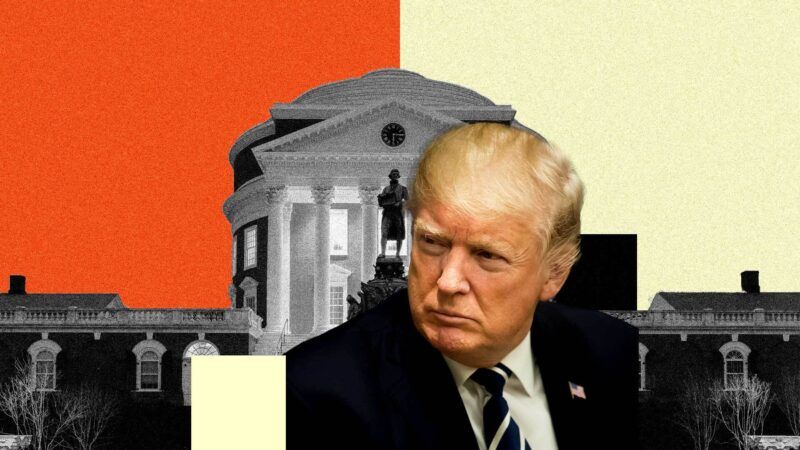I'm No Fan of UVA's President. That Doesn't Mean the Government Should Force Him Out.
Jim Ryan is the latest casualty in Trump's unconstitutional war against elite universities.

On Friday, University of Virginia President Jim Ryan announced that he was stepping down after the Justice Department demanded that he resign as a condition of resolving an investigation into the school's diversity programs.
"To make a long story short, I am inclined to fight for what I believe in, and I believe deeply in this University," Ryan said in a statement explaining his decision to resign. "But I cannot make a unilateral decision to fight the federal government in order to save my own job. To do so would not only be quixotic but appear selfish and self-centered to the hundreds of employees who would lose their jobs, the researchers who would lose their funding, and the hundreds of students who could lose financial aid or have their visas withheld."
Ryan became UVA president during my first year at the university. While my friends filled their Instagram stories with praise for Ryan and outrage at Trump and a former university counsel lamented in The New York Times that "his departure will result in a less inclusive university community, which will harm all students who choose the University of Virginia," I'll admit that I've had trouble summoning the same pity for Ryan.
To be honest, I have no particular affection for Ryan. During his tenure as president, I found him to be far from a principled defender of the "great and good"—a phrase he frequently used to describe his goals for the university. When a UVA student put a strongly worded sign on her door accusing the university of racism, administrators threatened to kick her out of her dorm. That same academic year, he allowed a student to be illegally punished by the school's student-run judicial body after a popular student activist baselessly accused her of racism. (That case, which I investigated for Reason in 2023, resulted in a lawsuit that was settled last year.) When UVA students attempted a pro-Palestine encampment, he called in four different police forces to break it up, leading to disquieting, if technically legal, scenes of cops in riot gear manhandling protesters.
Admittedly, these sins are far from unique. A college president failing to be a perfect civil libertarian under public pressure is not uncommon. Ryan—like all university presidents—is first and foremost a bureaucrat, whose main job is to raise money for the university and ensure it gets the maximum amount of good press and the minimum amount of bad press.
Still, none of that means that the Justice Department was justified in pushing him out. Ryan got screwed over; he is the latest casualty of the Trump administration's war against elite universities.
On its face, there are some elements of the Trump administration's civil rights investigations into universities that I should support. Especially in light of Students for Fair Admission v. Harvard, which clarified that race-based affirmative action violates civil rights law, it's pretty obvious that most selective universities are engaging in illegal racial quotas in admissions and faculty hiring.
But the Trump administration has shown itself incapable of investigating illegal discrimination in good faith. So far, it's used flimsy accusations of antisemitism to yank Harvard's federal funding, briefly ban the school from taking international students, and demand that the school somehow both use exclusively merit-based measures when hiring faculty yet ensure ideological diversity. And that's just one school.
I happen to be quite fond of the Civil Rights Act, and I'd like the government to enforce it. But do I trust the Trump administration to only investigate UVA for conduct that violates civil rights law and not try to censor completely protected faculty and student speech? And do I trust the Trump administration to give UVA the legally required due process when carrying out its investigation? Of course not.
